Analyzing Alcohol Reduction Using the Transtheoretical Model & Stages
VerifiedAdded on 2023/05/27
|6
|1488
|413
Essay
AI Summary
This essay explores the transtheoretical model (TTM), also known as the stages of change model, and its application to reducing excessive alcohol consumption. The TTM outlines five stages: precontemplation, contemplation, preparation, action, and maintenance, each characterized by different levels of awareness, intention, and behavior. The essay details the processes of change associated with each stage, such as consciousness raising, dramatic relief, self-reevaluation, and stimulus control, and suggests appropriate interventions to facilitate movement between stages. For example, in the precontemplation stage, interventions focus on increasing awareness, while in the action stage, social support and commitment are emphasized. The essay also acknowledges limitations of the model, including its neglect of social context and the lack of clear timelines for each stage. Overall, the essay provides a comprehensive overview of how the TTM can be used to understand and promote behavior change in the context of alcohol consumption, highlighting the importance of tailored interventions and a cyclical approach to recovery. Desklib offers this essay as a resource for students, alongside a wide range of study tools and solved assignments.
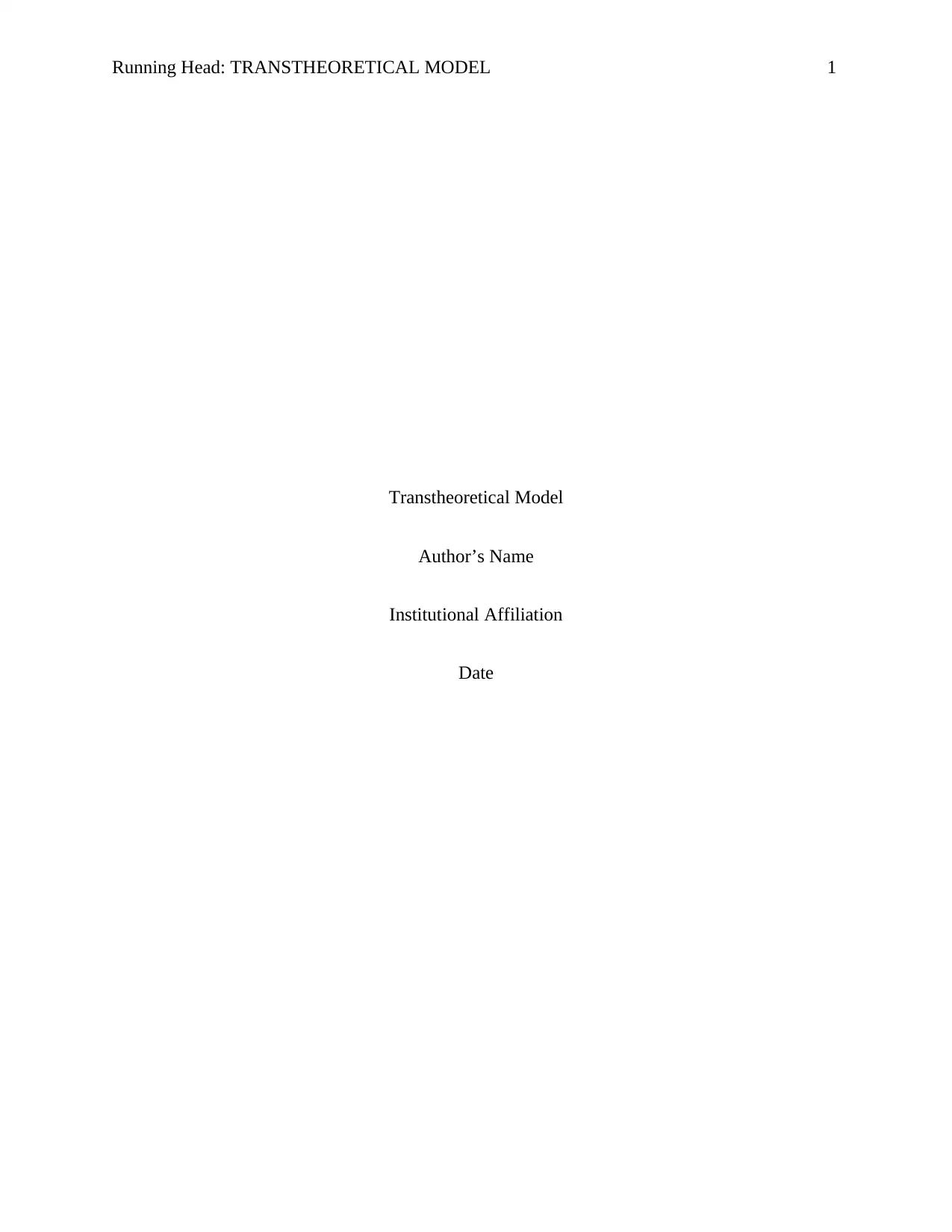
Running Head: TRANSTHEORETICAL MODEL 1
Transtheoretical Model
Author’s Name
Institutional Affiliation
Date
Transtheoretical Model
Author’s Name
Institutional Affiliation
Date
Paraphrase This Document
Need a fresh take? Get an instant paraphrase of this document with our AI Paraphraser
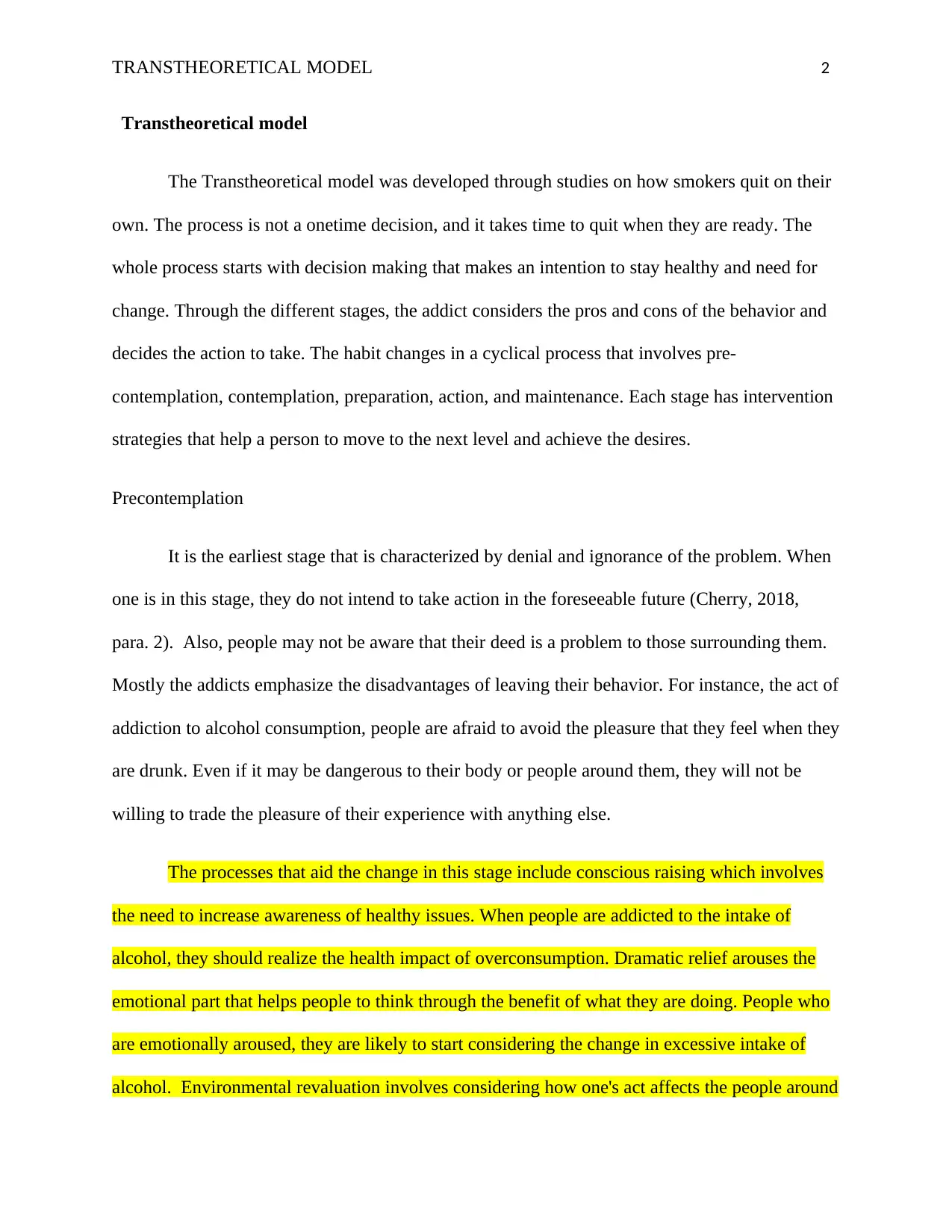
TRANSTHEORETICAL MODEL 2
Transtheoretical model
The Transtheoretical model was developed through studies on how smokers quit on their
own. The process is not a onetime decision, and it takes time to quit when they are ready. The
whole process starts with decision making that makes an intention to stay healthy and need for
change. Through the different stages, the addict considers the pros and cons of the behavior and
decides the action to take. The habit changes in a cyclical process that involves pre-
contemplation, contemplation, preparation, action, and maintenance. Each stage has intervention
strategies that help a person to move to the next level and achieve the desires.
Precontemplation
It is the earliest stage that is characterized by denial and ignorance of the problem. When
one is in this stage, they do not intend to take action in the foreseeable future (Cherry, 2018,
para. 2). Also, people may not be aware that their deed is a problem to those surrounding them.
Mostly the addicts emphasize the disadvantages of leaving their behavior. For instance, the act of
addiction to alcohol consumption, people are afraid to avoid the pleasure that they feel when they
are drunk. Even if it may be dangerous to their body or people around them, they will not be
willing to trade the pleasure of their experience with anything else.
The processes that aid the change in this stage include conscious raising which involves
the need to increase awareness of healthy issues. When people are addicted to the intake of
alcohol, they should realize the health impact of overconsumption. Dramatic relief arouses the
emotional part that helps people to think through the benefit of what they are doing. People who
are emotionally aroused, they are likely to start considering the change in excessive intake of
alcohol. Environmental revaluation involves considering how one's act affects the people around
Transtheoretical model
The Transtheoretical model was developed through studies on how smokers quit on their
own. The process is not a onetime decision, and it takes time to quit when they are ready. The
whole process starts with decision making that makes an intention to stay healthy and need for
change. Through the different stages, the addict considers the pros and cons of the behavior and
decides the action to take. The habit changes in a cyclical process that involves pre-
contemplation, contemplation, preparation, action, and maintenance. Each stage has intervention
strategies that help a person to move to the next level and achieve the desires.
Precontemplation
It is the earliest stage that is characterized by denial and ignorance of the problem. When
one is in this stage, they do not intend to take action in the foreseeable future (Cherry, 2018,
para. 2). Also, people may not be aware that their deed is a problem to those surrounding them.
Mostly the addicts emphasize the disadvantages of leaving their behavior. For instance, the act of
addiction to alcohol consumption, people are afraid to avoid the pleasure that they feel when they
are drunk. Even if it may be dangerous to their body or people around them, they will not be
willing to trade the pleasure of their experience with anything else.
The processes that aid the change in this stage include conscious raising which involves
the need to increase awareness of healthy issues. When people are addicted to the intake of
alcohol, they should realize the health impact of overconsumption. Dramatic relief arouses the
emotional part that helps people to think through the benefit of what they are doing. People who
are emotionally aroused, they are likely to start considering the change in excessive intake of
alcohol. Environmental revaluation involves considering how one's act affects the people around
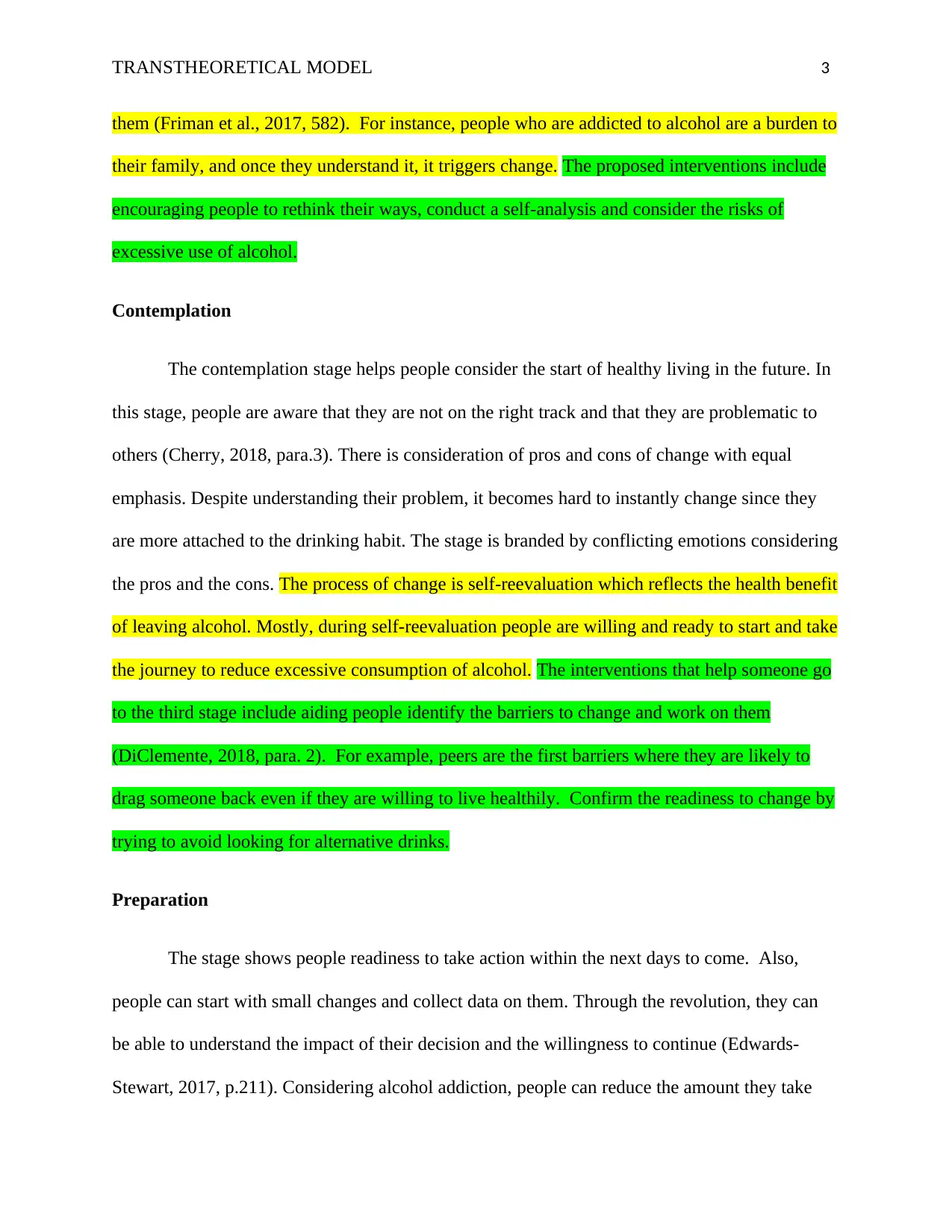
TRANSTHEORETICAL MODEL 3
them (Friman et al., 2017, 582). For instance, people who are addicted to alcohol are a burden to
their family, and once they understand it, it triggers change. The proposed interventions include
encouraging people to rethink their ways, conduct a self-analysis and consider the risks of
excessive use of alcohol.
Contemplation
The contemplation stage helps people consider the start of healthy living in the future. In
this stage, people are aware that they are not on the right track and that they are problematic to
others (Cherry, 2018, para.3). There is consideration of pros and cons of change with equal
emphasis. Despite understanding their problem, it becomes hard to instantly change since they
are more attached to the drinking habit. The stage is branded by conflicting emotions considering
the pros and the cons. The process of change is self-reevaluation which reflects the health benefit
of leaving alcohol. Mostly, during self-reevaluation people are willing and ready to start and take
the journey to reduce excessive consumption of alcohol. The interventions that help someone go
to the third stage include aiding people identify the barriers to change and work on them
(DiClemente, 2018, para. 2). For example, peers are the first barriers where they are likely to
drag someone back even if they are willing to live healthily. Confirm the readiness to change by
trying to avoid looking for alternative drinks.
Preparation
The stage shows people readiness to take action within the next days to come. Also,
people can start with small changes and collect data on them. Through the revolution, they can
be able to understand the impact of their decision and the willingness to continue (Edwards-
Stewart, 2017, p.211). Considering alcohol addiction, people can reduce the amount they take
them (Friman et al., 2017, 582). For instance, people who are addicted to alcohol are a burden to
their family, and once they understand it, it triggers change. The proposed interventions include
encouraging people to rethink their ways, conduct a self-analysis and consider the risks of
excessive use of alcohol.
Contemplation
The contemplation stage helps people consider the start of healthy living in the future. In
this stage, people are aware that they are not on the right track and that they are problematic to
others (Cherry, 2018, para.3). There is consideration of pros and cons of change with equal
emphasis. Despite understanding their problem, it becomes hard to instantly change since they
are more attached to the drinking habit. The stage is branded by conflicting emotions considering
the pros and the cons. The process of change is self-reevaluation which reflects the health benefit
of leaving alcohol. Mostly, during self-reevaluation people are willing and ready to start and take
the journey to reduce excessive consumption of alcohol. The interventions that help someone go
to the third stage include aiding people identify the barriers to change and work on them
(DiClemente, 2018, para. 2). For example, peers are the first barriers where they are likely to
drag someone back even if they are willing to live healthily. Confirm the readiness to change by
trying to avoid looking for alternative drinks.
Preparation
The stage shows people readiness to take action within the next days to come. Also,
people can start with small changes and collect data on them. Through the revolution, they can
be able to understand the impact of their decision and the willingness to continue (Edwards-
Stewart, 2017, p.211). Considering alcohol addiction, people can reduce the amount they take
⊘ This is a preview!⊘
Do you want full access?
Subscribe today to unlock all pages.

Trusted by 1+ million students worldwide
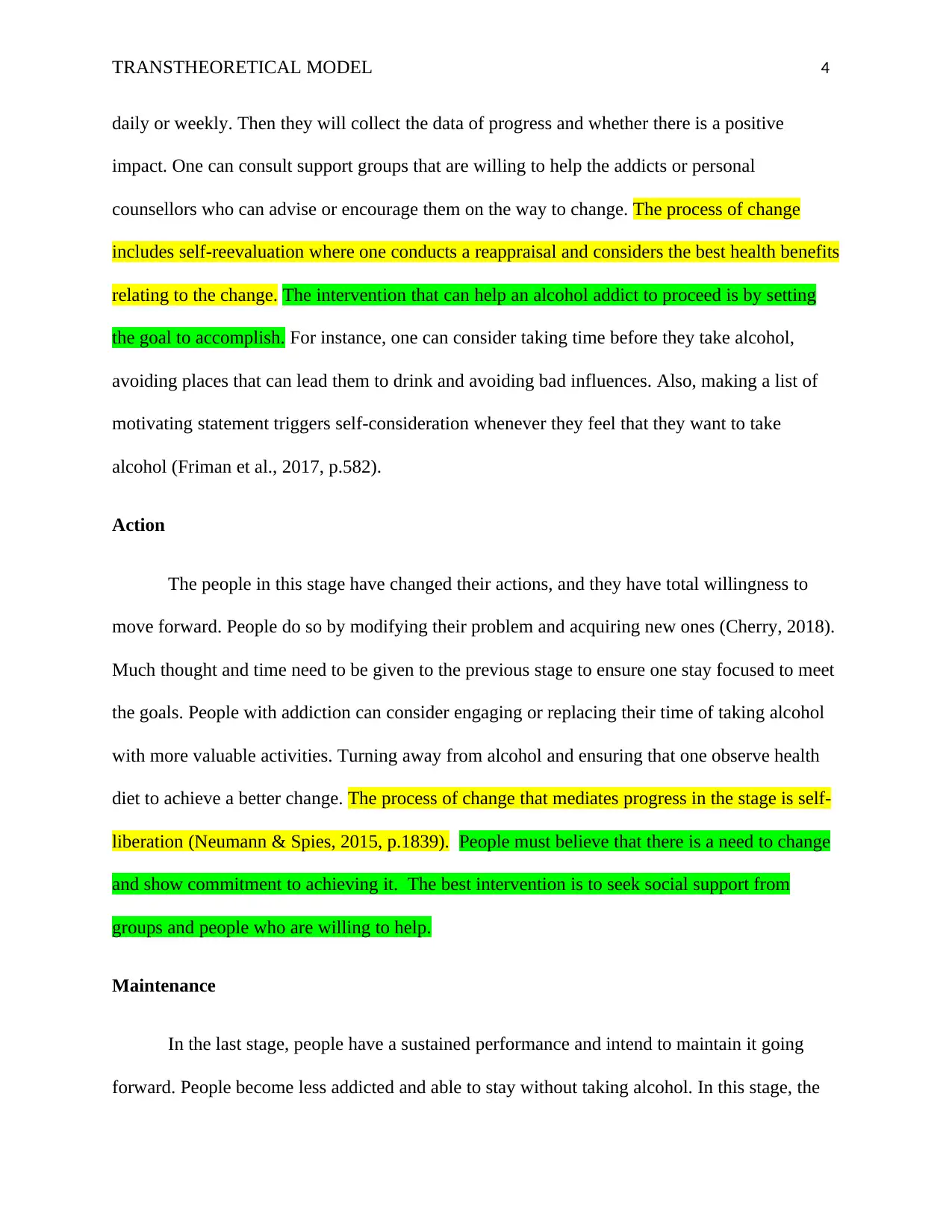
TRANSTHEORETICAL MODEL 4
daily or weekly. Then they will collect the data of progress and whether there is a positive
impact. One can consult support groups that are willing to help the addicts or personal
counsellors who can advise or encourage them on the way to change. The process of change
includes self-reevaluation where one conducts a reappraisal and considers the best health benefits
relating to the change. The intervention that can help an alcohol addict to proceed is by setting
the goal to accomplish. For instance, one can consider taking time before they take alcohol,
avoiding places that can lead them to drink and avoiding bad influences. Also, making a list of
motivating statement triggers self-consideration whenever they feel that they want to take
alcohol (Friman et al., 2017, p.582).
Action
The people in this stage have changed their actions, and they have total willingness to
move forward. People do so by modifying their problem and acquiring new ones (Cherry, 2018).
Much thought and time need to be given to the previous stage to ensure one stay focused to meet
the goals. People with addiction can consider engaging or replacing their time of taking alcohol
with more valuable activities. Turning away from alcohol and ensuring that one observe health
diet to achieve a better change. The process of change that mediates progress in the stage is self-
liberation (Neumann & Spies, 2015, p.1839). People must believe that there is a need to change
and show commitment to achieving it. The best intervention is to seek social support from
groups and people who are willing to help.
Maintenance
In the last stage, people have a sustained performance and intend to maintain it going
forward. People become less addicted and able to stay without taking alcohol. In this stage, the
daily or weekly. Then they will collect the data of progress and whether there is a positive
impact. One can consult support groups that are willing to help the addicts or personal
counsellors who can advise or encourage them on the way to change. The process of change
includes self-reevaluation where one conducts a reappraisal and considers the best health benefits
relating to the change. The intervention that can help an alcohol addict to proceed is by setting
the goal to accomplish. For instance, one can consider taking time before they take alcohol,
avoiding places that can lead them to drink and avoiding bad influences. Also, making a list of
motivating statement triggers self-consideration whenever they feel that they want to take
alcohol (Friman et al., 2017, p.582).
Action
The people in this stage have changed their actions, and they have total willingness to
move forward. People do so by modifying their problem and acquiring new ones (Cherry, 2018).
Much thought and time need to be given to the previous stage to ensure one stay focused to meet
the goals. People with addiction can consider engaging or replacing their time of taking alcohol
with more valuable activities. Turning away from alcohol and ensuring that one observe health
diet to achieve a better change. The process of change that mediates progress in the stage is self-
liberation (Neumann & Spies, 2015, p.1839). People must believe that there is a need to change
and show commitment to achieving it. The best intervention is to seek social support from
groups and people who are willing to help.
Maintenance
In the last stage, people have a sustained performance and intend to maintain it going
forward. People become less addicted and able to stay without taking alcohol. In this stage, the
Paraphrase This Document
Need a fresh take? Get an instant paraphrase of this document with our AI Paraphraser
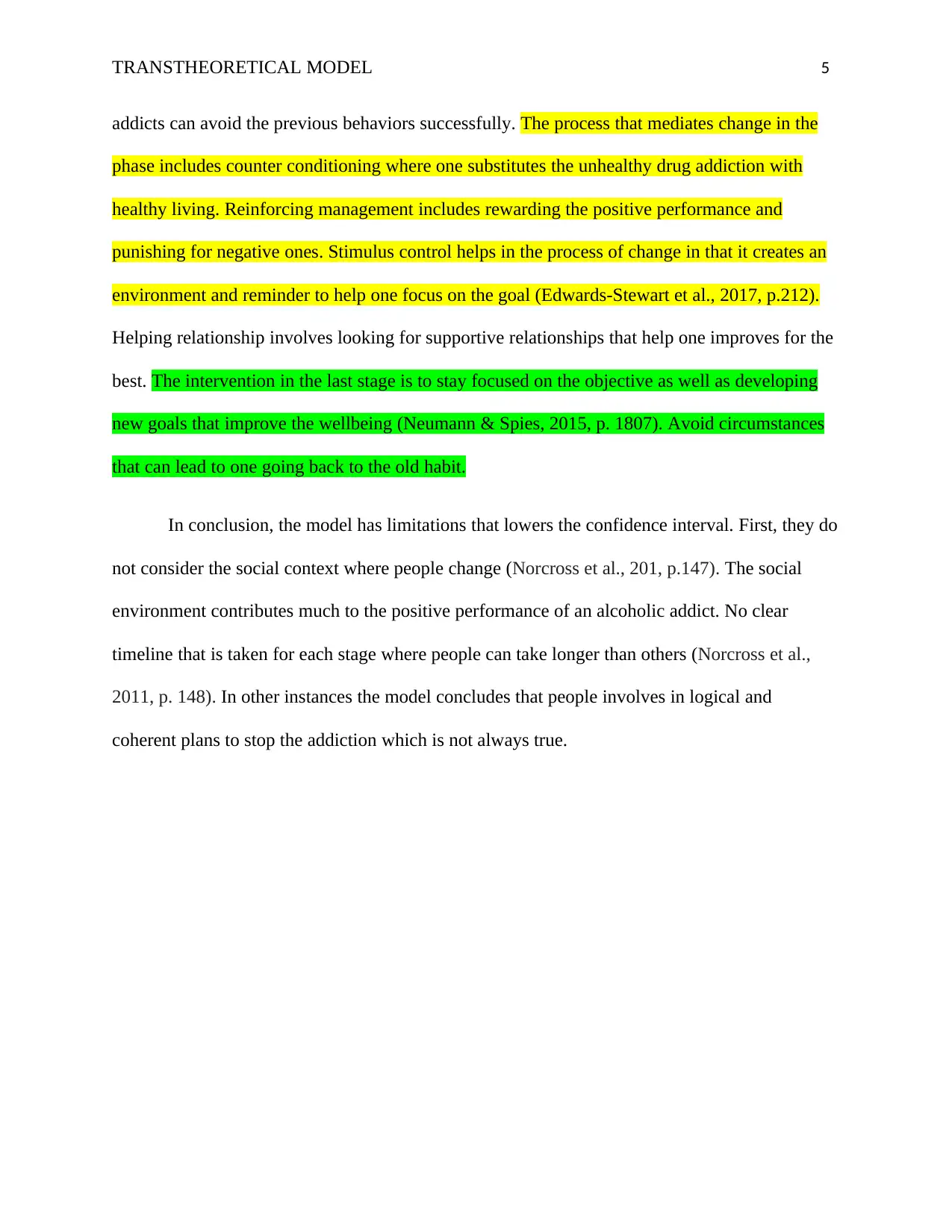
TRANSTHEORETICAL MODEL 5
addicts can avoid the previous behaviors successfully. The process that mediates change in the
phase includes counter conditioning where one substitutes the unhealthy drug addiction with
healthy living. Reinforcing management includes rewarding the positive performance and
punishing for negative ones. Stimulus control helps in the process of change in that it creates an
environment and reminder to help one focus on the goal (Edwards-Stewart et al., 2017, p.212).
Helping relationship involves looking for supportive relationships that help one improves for the
best. The intervention in the last stage is to stay focused on the objective as well as developing
new goals that improve the wellbeing (Neumann & Spies, 2015, p. 1807). Avoid circumstances
that can lead to one going back to the old habit.
In conclusion, the model has limitations that lowers the confidence interval. First, they do
not consider the social context where people change (Norcross et al., 201, p.147). The social
environment contributes much to the positive performance of an alcoholic addict. No clear
timeline that is taken for each stage where people can take longer than others (Norcross et al.,
2011, p. 148). In other instances the model concludes that people involves in logical and
coherent plans to stop the addiction which is not always true.
addicts can avoid the previous behaviors successfully. The process that mediates change in the
phase includes counter conditioning where one substitutes the unhealthy drug addiction with
healthy living. Reinforcing management includes rewarding the positive performance and
punishing for negative ones. Stimulus control helps in the process of change in that it creates an
environment and reminder to help one focus on the goal (Edwards-Stewart et al., 2017, p.212).
Helping relationship involves looking for supportive relationships that help one improves for the
best. The intervention in the last stage is to stay focused on the objective as well as developing
new goals that improve the wellbeing (Neumann & Spies, 2015, p. 1807). Avoid circumstances
that can lead to one going back to the old habit.
In conclusion, the model has limitations that lowers the confidence interval. First, they do
not consider the social context where people change (Norcross et al., 201, p.147). The social
environment contributes much to the positive performance of an alcoholic addict. No clear
timeline that is taken for each stage where people can take longer than others (Norcross et al.,
2011, p. 148). In other instances the model concludes that people involves in logical and
coherent plans to stop the addiction which is not always true.
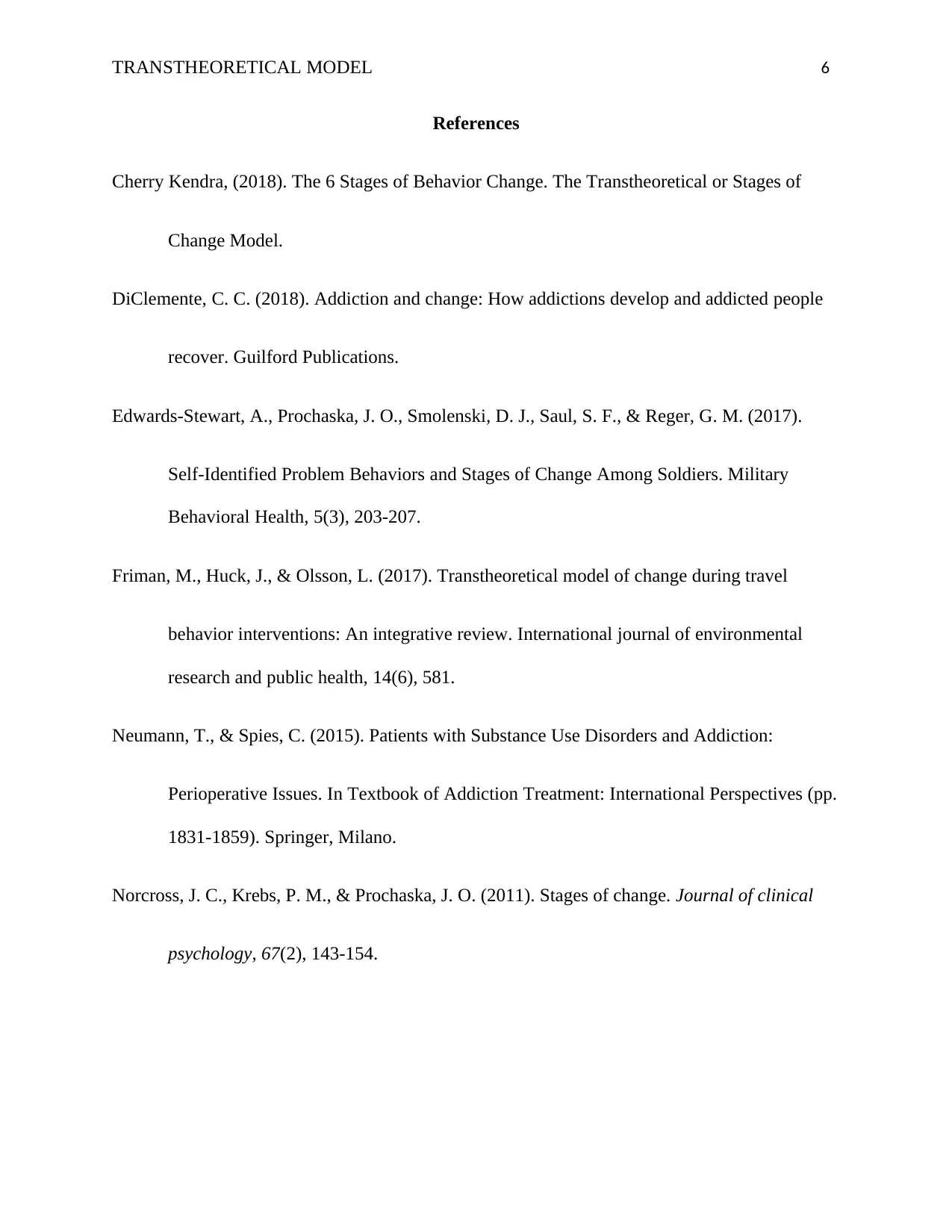
TRANSTHEORETICAL MODEL 6
References
Cherry Kendra, (2018). The 6 Stages of Behavior Change. The Transtheoretical or Stages of
Change Model.
DiClemente, C. C. (2018). Addiction and change: How addictions develop and addicted people
recover. Guilford Publications.
Edwards-Stewart, A., Prochaska, J. O., Smolenski, D. J., Saul, S. F., & Reger, G. M. (2017).
Self-Identified Problem Behaviors and Stages of Change Among Soldiers. Military
Behavioral Health, 5(3), 203-207.
Friman, M., Huck, J., & Olsson, L. (2017). Transtheoretical model of change during travel
behavior interventions: An integrative review. International journal of environmental
research and public health, 14(6), 581.
Neumann, T., & Spies, C. (2015). Patients with Substance Use Disorders and Addiction:
Perioperative Issues. In Textbook of Addiction Treatment: International Perspectives (pp.
1831-1859). Springer, Milano.
Norcross, J. C., Krebs, P. M., & Prochaska, J. O. (2011). Stages of change. Journal of clinical
psychology, 67(2), 143-154.
References
Cherry Kendra, (2018). The 6 Stages of Behavior Change. The Transtheoretical or Stages of
Change Model.
DiClemente, C. C. (2018). Addiction and change: How addictions develop and addicted people
recover. Guilford Publications.
Edwards-Stewart, A., Prochaska, J. O., Smolenski, D. J., Saul, S. F., & Reger, G. M. (2017).
Self-Identified Problem Behaviors and Stages of Change Among Soldiers. Military
Behavioral Health, 5(3), 203-207.
Friman, M., Huck, J., & Olsson, L. (2017). Transtheoretical model of change during travel
behavior interventions: An integrative review. International journal of environmental
research and public health, 14(6), 581.
Neumann, T., & Spies, C. (2015). Patients with Substance Use Disorders and Addiction:
Perioperative Issues. In Textbook of Addiction Treatment: International Perspectives (pp.
1831-1859). Springer, Milano.
Norcross, J. C., Krebs, P. M., & Prochaska, J. O. (2011). Stages of change. Journal of clinical
psychology, 67(2), 143-154.
⊘ This is a preview!⊘
Do you want full access?
Subscribe today to unlock all pages.

Trusted by 1+ million students worldwide
1 out of 6
Related Documents
Your All-in-One AI-Powered Toolkit for Academic Success.
+13062052269
info@desklib.com
Available 24*7 on WhatsApp / Email
![[object Object]](/_next/static/media/star-bottom.7253800d.svg)
Unlock your academic potential
Copyright © 2020–2026 A2Z Services. All Rights Reserved. Developed and managed by ZUCOL.




